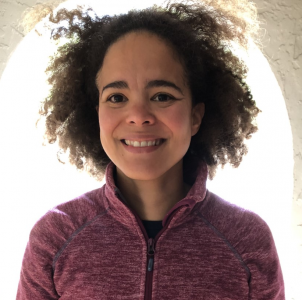Professor Jasquelin Peña joins the Department of Civil and Environmental Engineering
 June 23, 2020
June 23, 2020
By Rachel Steere
From studying environmental and molecular biogeochemistry to addressing water quality issues, Jasquelin Peña looks forward to sharing her knowledge and connecting with UC Davis students this fall.
“I love explaining and translating concepts. I feel fulfilled when I see a student engaged. Every time I teach, I can revisit the material, learn it more deeply and adapt to current events and society in general. I also learn from seeing the material through my students’ eyes,” said Peña. “Teaching gives me the opportunity to transform someone’s way of seeing the world and impact their life.”
Peña joined the UC Davis Department of Civil and Environmental Engineering as an associate professor starting this spring. Her research lies at the intersection of natural, managed and engineered ecosystems and aims to advance sustainable solutions to environmental quality problems. She is teaching two existing courses in the department and developing a new graduate course on applying water chemistry to solve environmental pollution problems.
Peña’s research has significant relevance to contaminant cycling, the biogeochemical pathways by which metals and metalloids are transformed and moved through various states by geological and biological processes. In addition to improving water quality in ecosystems degraded by human activities and by climate change events, she also seeks to improve the livelihood of disadvantaged communities that are often disproportionately impacted by environmental pollution.
“I am an experimentalist. I love the moment when you understand how to manipulate a system and how to design an experiment to probe a particular process or reaction pathway. Environmental systems are so complex – in soil, for example, we have water, minerals, organic material, microorganisms and you need to contend with these various interactions and find ways to work with or around that complexity,” said Peña.
Peña received her B.S. in chemical engineering from Yale University in 2001, and her M.S. and Ph.D. degrees from UC Berkeley in 2004 and 2009, both in environmental engineering. Peña has been working in the field of environmental and molecular biogeochemistry since she joined Lawrence Berkeley National Laboratory as a research associate in 2001.
Prior to coming to UC Davis, Peña taught in the Faculty of Geoscience and Environment at the University of Lausanne in Switzerland, where she was awarded a grant from the Sandoz Family Foundation to start a research group in environmental mineralogy and geochemistry.
“It was a great opportunity. I was able to work on a number of fundamental and applied projects. I taught aquatic chemistry in French! After nine years, though, I wanted to come back to California to work on water issues relevant to the Western US. California suffers from water scarcity, a problem that is being compounded by climate change. Additionally, millions of Californians lack access to safe, clean drinking water as a result of pollution. I am excited to have the opportunity to do research that improves access to clean water for everyone,” said Peña.
Peña also has a faculty scientist appointment in the Energy Geosciences Division at the Lawrence Berkeley National Laboratory and plans to engage with Department of Energy-supported projects and benefit from different user facilities such as the Molecular Foundry and the Advanced Light Source.
“When I visited Davis for an interview, I was so impressed by the vibrant and friendly feel of the campus and by how welcoming everyone was. I am so excited to be here! I hope my appointment will foster greater exchange between UC Davis and Berkeley Lab,” said Peña.
Peña was a part of the newest cohort of scholars inducted into the Center for the Advancement of Multicultural Perspectives on Science (CAMPOS) and the Center for the Advancement of Multicultural Perspective on Social Science, Arts and Humanities (CAMPSSAH) at UC Davis.
The mission of CAMPOS and CAMPSSAH is to support the discovery of knowledge by promoting women in science, starting with Latina STEM scholars and expanding to all underrepresented groups in STEM through building an inclusive environment that is diversity-driven, mentorship-grounded and career-success focused.
“I am proud to be part of an academic community that embraces and respects diversity, not only in terms of the experiences and backgrounds of all of its members, but in their approach to research, teaching and public service. With CAMPOS and CAMSSAH, I hope to form partnerships that will enhance my ability to help remove barriers and ensure that individuals feel valued and supported to reach their full potential,” said Peña. “This is an important resource and I am glad to have access to this community of scholars. I am looking forward to engaging with the other scholars as we return to in-person campus life.”
